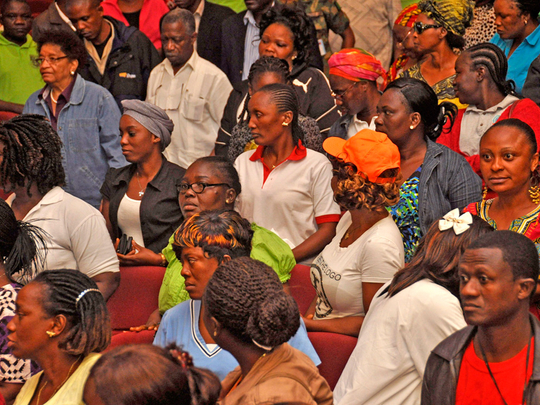
Monrovia: Residents of northern Liberia have existed in a state of peril for months as the deadly Ebola epidemic swept through the region. Now they face a new threat as measures to stem the spread of the virus spark fears of starvation.
In an effort to contain an epidemic that has cost nearly 1,000 lives throughout West Africa, the Liberian government quarantined the most affected northern provinces — cutting off access with military roadblocks and restrictions on travel.
The quarantine has meant that traders have been unable to travel to buy food and farmers cannot harvest their crop, which has in turn caused shortages and sent prices soaring.
“People are panicking here. We are afraid to die from hunger,” said Siaffa Kamara, from Bopolu, north of the capital Monrovia.
“This is rainy season and it is raining everywhere. The little money I had I used to buy rice, which is very expensive. What I bought is not enough for three weeks. I have 25 people to feed in my house,” he told AFP by phone.
“We agree that measures have to be put in place to contain the virus but at the same time we don’t have to die from hunger,” said Miatta Sharif, also from Bopolu.
“Clinics are closed, if we cannot get food to eat how do we survive? The victims will be more than that of Ebola,” she added.
The restrictions came into force on Wednesday when Liberia declared a state of emergency to try and stop the spread of virus. The army has been deployed to restrict movement, particularly from the worst-affected provinces to the capital.
President Ellen Johnson Sirleaf warned that the extraordinary measures were needed “for the very survival of our state”.
State of emergency
Speaking on Thursday, Defence Minister Brownie Samukai said residents of virus-hit areas in the north to stay put.
“Stay where you are because if you leave your place for another place you may not be allowed to go back to where you came from,” he said.
As a result, traders in those areas have dared not go to Monrovia for supplies.
“The goods I had are finished. I don’t have any more rice here. The little that I have I am keeping it for my family,” Paul Fahnbuleh, a rice-trader from the north-west told AFP.
On Thursday, Liberian lawmakers approved an emergency package to provide compensation for families who have been directly affected by the Ebola epidemic, as well as health workers on the front line.
They also considered paying an advance on the salaries of civil servants caught in quarantined zones.
But for many, the help is not coming fast enough.
Sando Johnson, a senator in the province of Bomi, northwest of Monrovia, said the restrictions were “severe” and warned people would die of starvation if they are not relaxed.
“My county has been completely quarantined because soldiers don’t allow anyone to get out of the area and they don’t allow anyone to go there,” he told AFP by phone.
“A bag of rice that sold for 1,300LD ($14, €11, Dh51.41) is now selling for 1,800LD. The poor people will die of hunger for God’s sake. These are Liberians like others.”
‘We’re starving’
At a military checkpoint on the edge of the quarantine line in Bomy County, many expressed anger at the restrictions.
“Let the government see reason,” said Augustine Kimber, a plantation worker. “If they do not, there will be many deaths ... not from Ebola but from hunger.”
Others simply doubted the government’s plan of action would work.
“I think there should be another means put into place that will actually curtail the spread of Ebola,” said student Morris V. Ware.
The Ebola virus can fell its victims within days, causing severe fever and muscle pain, weakness, vomiting and diarrhoea — in some cases shutting down organs and causing unstoppable bleeding.
The World Health Organisation (WHO) has declared the latest outbreak “a public health emergency of international concern.”












